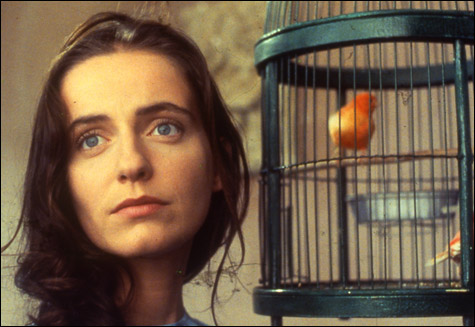
VALLE ABRAAO: A kind of exhaustive study of bovarysme rather than its dramatic expression. |
| “Manoel De Oliveira, or Cinema, The Art of Enigma” | Harvard Film Archive: March 15-29 |
Manoel de Oliveira occupies a unique seat on the global film culture’s board of directors — he’s routinely described as a long-time master who began when his native Portugal was still in the silent era, and whose career has lasted nearly 80 years since. And yet English-speaking filmgoers had no idea who he was until the early ’90s, when VALLE ABRAAO|ABRAHAM’S VALLEY (1993; March 29 at 3 pm) began making the festival rounds. He may be an unassailable mandarin, but his films — often beautiful but rarely stylish or innovative or thematically fresh — are wickedly difficult to make a case for. What’s more, they vary in form and tone, from formula melodramas to documentaries to meta-docs to post-mod Pirandello-isms to straight-on literary adaptations that long to be books rather than films. The fact that his output has accelerated as the accolades have mounted over the past decade is only more puzzling — when others would be retiring, Oliveira gives us movie after movie that begs to be indulged, with great affection, as the autumnal output of a codger deserving of, if not destined for, a Lifetime Achievement Oscar.He is a beneficiary of ageist celebrity as surely as any twentysomething wunderkind. But it’s been difficult to look at him any other way; Oliveira is the only authentic Portuguese auteur anyone can name, a lone man standing in a Euro-culture robbed of a proper new wave. Having been devastated by a lengthy dictatorship and the persistent demons of late colonialism like no other Western European nation, Portugal has proved lately to be fertile soil for generational anomie and disaffected realism, as seen in the thorny, desolate films of Pedro Costa, Teresa Villaverde, and Manuela Viegas. But Oliveira has not become famous and beloved because of his Portuguese-ness — indeed, his late-stage blossoming is European Market–bound, marked by an eagerness to use French, Italian, and American stars, and screenplays written in French. He has become his own industry.

He is surely the only unretired director to ever be fêted with a retro on the occasion of his 100th birthday — and have it include a film he made when he was 99. But, taking a ladle to what is an almost impossibly expansive filmography, I must say his earlier, less refined movies interest me much more than his late work. (More than half of his entire output has appeared after he turned 80.) Still, the least you could say about the recent films is that they achieve a seductive painterliness, and that he has earned the right and the need simply to observe — a theatrical performance, a tree, a bustling street corner, a Ferris wheel, etc., often in a circular track that’s the closest thing he has to a signature shot — as an octogenarian might, taking a basic pleasure in the beautiful messiness of the world. He places his camera and times his scenes with one priority: our respect for the characters and the actors, their privacy as well as their exhibition. Often, as when he casts Marcello Mastroianni, Michel Piccoli, and Catherine Deneuve, he seems most of all interested in honoring their refulgent personas and their cultural iconicity. This, sad to say, seems to be the world we live in, where a sophisticated, experienced man’s thoughtful, patient, and ardent regard for the world around him is so unusual as to be remarkable.
Valle Abraao is a curious ignition for worldwide cine-fame: a three-hour-plus, self-consciously literary and hyper-rehearsed study of the Madame Bovary template in which a lovely young girl (Leonor Silveira) from an upper-class family subtly wields her beauty like a weapon and becomes a restless and unfaithful wife to a romantic doctor (Luís Miguel Cintra). Oliveira’s approach is kind of a Bresson/Buñuel bouillabaisse, stressing the stiff artificiality of his scenes, and the narration over the action (which describes dialogues and actions as they happen), while at the same time going for a sarcastic satire whose very flatness is part of the joke. Silveira (who like many of Oliveira’s actors appears in scores of his films, in parts large and small) has one of those amazing movie faces that seems to change from minute to minute, but her performance is held six inches away from conviction — as the narration informs us that she smiles “as if to bite them,” Silveira grins toothily in a risible manner that suggests Oliveira’s discontent with representation of all kinds. What we get from Valle Abraao is a kind of exhaustive study of bovarysme rather than its dramatic expression. Still, nothing obscures the disarmingly chilly moment when, during a tasteless dinner-party story, a crotchety aunt who’ll die in the very next scene turns slowly to the camera and gives us a mortified stare.